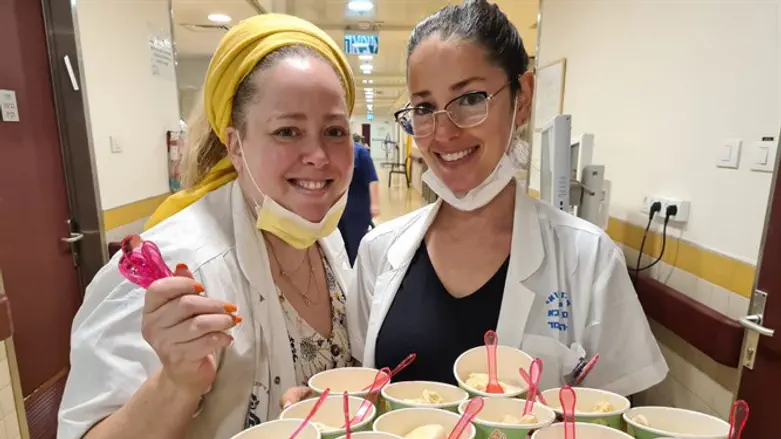
In the beloved 1964 family film Mary Poppins, the title character famously sang “a spoonful of sugar helps the medicine go down”.
Now dietitians at Sheba Medical Center, Israel’s largest hospital, are taking that advice to the next level by transforming their geriatric patients’ food supplements into ice cream.
At the height of the COVID-19 pandemic, when no visitors were allowed in the hospital, Sheba dietitians observed that their geriatric patients were extremely depressed, in poor nutritional condition, and barely eating. “Our only option was to give them nutritional liquid supplements,” said Meital Benjamin, a registered dietitian at Sheba Medical Center. “In one small bottle they get a full meal’s worth of nutrition, 330 calories and 20 grams of protein.”
Because getting geriatric patients to take their supplements is often challenging, a creative solution was needed to administer them in the most accessible way possible.
“The mental state of our patients at Sheba is of the utmost importance to us,” said Dana Weiner, RD, Director of the Division of Nutrition at Sheba Medical Center, who initiated the project together with Sheba’s Dr. Gilat Shenhav-Zaltzman. “Patients must be able to help themselves mentally in order to feel better. Beyond all the other excellent medical treatments our patients receive here at Sheba, if they do not have the physical energy needed, which the nutritional food supplements provide, they will not be able to get better.”
A brand-new ice cream making machine was donated to Sheba specifically for this purpose. The liquid supplements are poured into the machine and 45 minutes later a nutritional supplement-based ice cream is ready for consumption. The ice cream provides a healthy “comfort food” option for the geriatric patients and according to the staff and patients alike, it tastes good, too.
The supplement formulas, served at Sheba between breakfast and lunch in special cups just like at an ice cream parlor, come in four flavors: vanilla, chocolate, cocoa, and banana. According to Benjamin, when taken in their standard liquid form, the formulas have an aftertaste due to the vitamins added, but when served in frozen ice cream form, the formula tastes like real ice cream.
“The response to the new ice cream has been amazing,” says Benjamin, who runs the process together with fellow Sheba dietitian Ayelet Gur-Arie. “It’s much better than having to tell patients to ‘drink this’. And it’s tasty too. In fact, it’s so good, all the patients have been asking for second helpings.”
“The last thing I expected to receive while being at the hospital was ice cream,” said 78-year-old Rachel Sasson, who has been in treatment at Sheba for several months. “It’s a real treat. It tastes wonderful and warms my heart.”